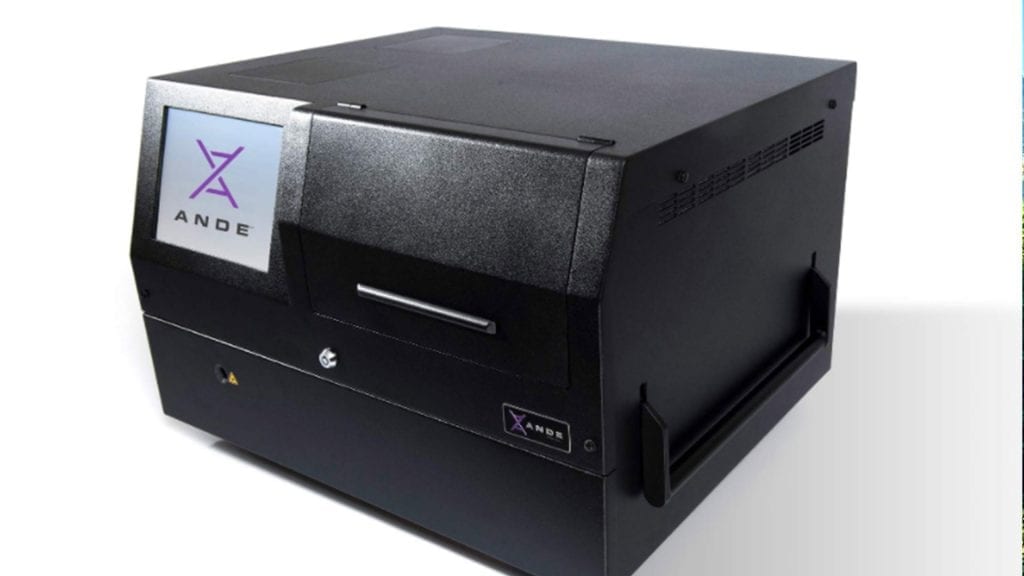
ANDE is a portable and rapid DNA-testing machine. Photo: ANDE
An American company is offering to provide its rapid DNA technology to help identify the remains of 215 children at the site of a former Indian residential school in Kamloops, B.C.
ANDE Corp. of Longmont, Colo., said its portable DNA machines have helped solve rape cases in Kentucky, identify wildfire victims in California, and verify family connections of migrants at the U.S.-Mexico border.
Now, it is willing to deploy a machine – roughly the size of an office printer – and a technician to the site of the former Kamloops Indian Residential school in central B.C.
“It’s cutting edge,” said Dave Carroll of Halifax, N.S., an investor in ANDE who asked the company to help the Tk’emlúps te Secwépemc First Nation with the horrifying discovery on its land.
“It does what it is supposed to do and it does it quickly. When you think about the backlogs in DNA (conventional laboratory testing) right now it’s torture.”
Ground-penetrating radar
The Tk’emlúps te Secwépemc announced May 27 it located the graves of 215 former residential school students using ground-penetrating radar.
The remains are believed to be that of First Nations children from B.C., Alberta and the Yukon, who were forced to attend the school operated by the Roman Catholic Church from 1890 to 1969 as part of the then-Canadian government’s assimilation plan.
APTN News asked Tk’emlúps te Secwépemc about the company’s offer. The Nation said it hoped to repatriate the remains and intended to release further information in the coming weeks.
It said it notified the BC Coroners Service about the gravesite.
The coroners’ service confirmed it was waiting for further information.
Band council
“We have offered any assistance within our mandate and, at the request of the Band Council, are now awaiting further information about their consultant’s report,” a spokesperson said in an email to APTN.
Carroll said ANDE (pronounced Andy) would be a valuable tool the band could operate on its own.
“What I appreciate about this technology so much is that it brings a little bit of closure, possibly, to families who I’m sure have never forgotten the names of the people that never came home.”
Company CEO George Heinrichs said he was moved by Carroll’s plea and the tragedy the band unearthed.
“We’re involved in other projects that have some similar characteristics,” Heinrichs said in a telephone interview.
In Iraq
“There’s some mass graves in Iraq that we’re working with the United Nations in trying to identify the victims. There’s similar work going on in Mexico.”
Heinrichs said ANDE was developed in 2016 “to solve a number of problems with processing DNA in the field.”
He said its “ruggedized” design is perfect for the U.S. military and justice officials, particularly the FBI.
“You can do it in the back of a helicopter or in a fast boat. The original uses were military – where they’re trying to identify bad guys and they do it both for living bad guys and dead bad guys.”
Heinrichs confirmed his company would help train band members to use the machine.
Database
“They could collect the data and keep it in their possession – they don’t have to give it to anyone,” he said. “When they collect samples (from living relatives) it’s not going into some bigger (or police) database.”
Heinrichs said the machine would identify remains as male, female, and human from only a small DNA sample. It would also confirm the victims’ heritage.
“The potential for an error here is one out of a trillion trillion,” he said in an interview.
“You can achieve very high-quality results…in 90 minutes.”
Using ANDE would make it possible to leave the remains where they are if that’s what families decide, Heinrichs added.
First Nation
“If you do the testing this way, the bones never need to leave Canada or leave that area…The First Nation can possess it, they manage it from end to end,” he said.
“They don’t ship anything anywhere. They’re not waiting for someone else to try to decide. It’s all right there in their hands.”
Heinrichs said two police forces in Canada – the RCMP and Edmonton Police Service – were familiar with ANDE.
“The technology itself, it’s been around quite a while at this point, and the results are stunningly better than what a lot of labs are producing at a lot more cost,” Heinrichs said.









